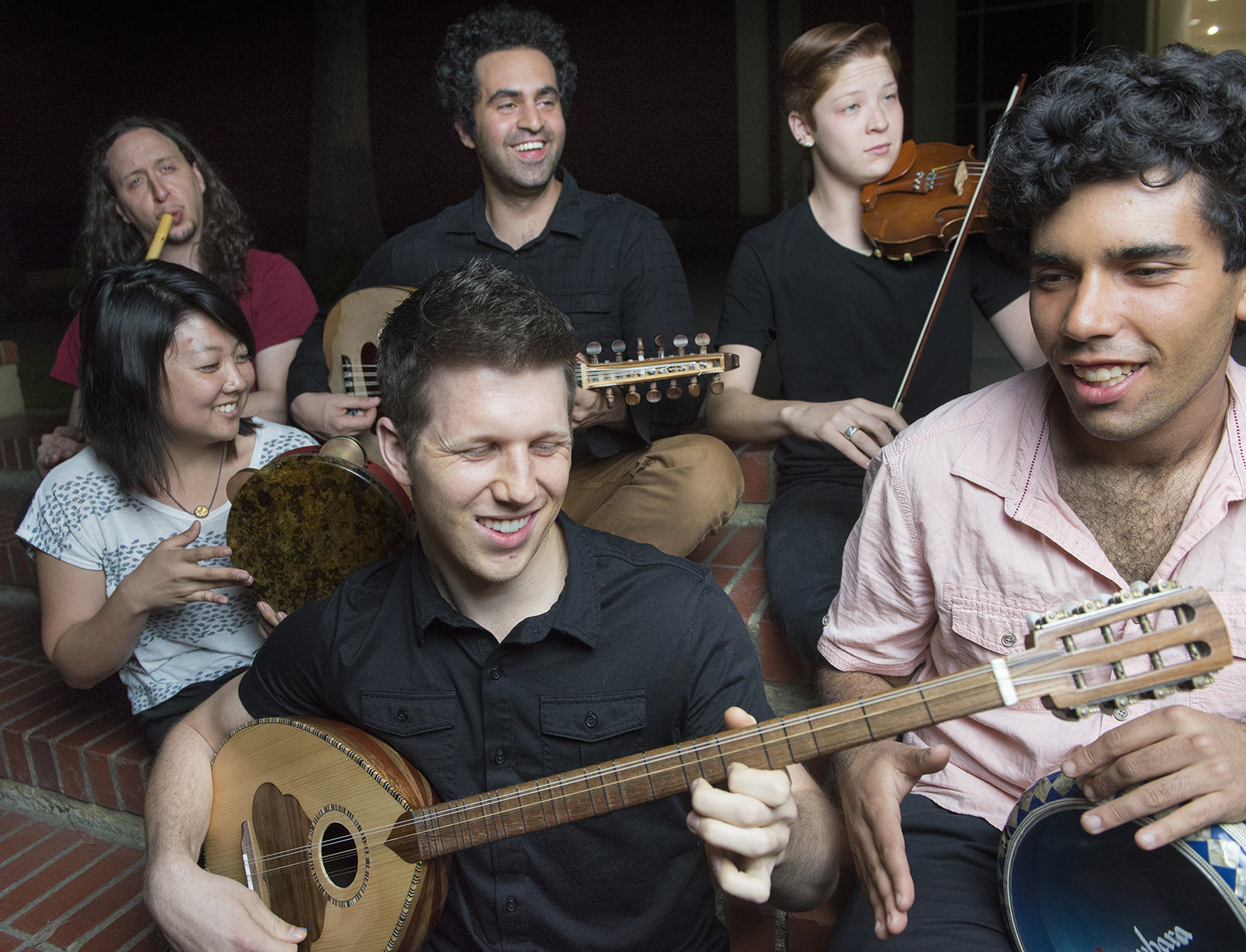Student musicians ‘Takht Dirty’ at Fowler Out Loud

Takht Dirty, a six-piece ensemble that will perform its contemporary take on traditional Arab music Thursday in the Fowler Out Loud concert series, was formed last year and is composed of instruments from the violin to the buzuq to the nay.
(Brandon Choe/Daily Bruin senior staff)
By Max Mcgee
April 10, 2014 12:10 a.m.
The precise plucking of a string with his nail creates an internal experience for musician Farzad Amoozegar-Fassie. From this spiritual perspective, the setar is a part of Amoozegar-Fassie’s body and soul.
Arab and Persian music traditions will mesh together on campus Thursday as graduate student Amoozegar-Fassie and student Arab music group Takht Dirty bring their Middle Eastern music to the Fowler Out Loud concert series.
The night starts off with Takht Dirty, a six-piece group of musicians and students taking a contemporary approach to traditional Arab music. Several instruments, including a wind instrument called the nay; the tabla, a drum; a long-necked lute called a buzuq; a violin; a tambourine called the riqq and a pear-shaped, string instrument called the ‘ud make up the ensemble.
Third-year ethnomusicology student Ziyad Marcus, who plays tabla with the ensemble, said the group formed midway through the last school year and has performed at several clubs, fundraisers and cultural events since.
“One way that we put a contemporary twist on this music is through percussion,” Marcus said. “A fraction of the show will be designated for a lively drum solo, which is not typically found in traditional Arabic music.”
Violinist and third-year ethnomusicology student Zoe Shay said that the ensemble will bring to the stage an acoustic set with vocals that audience members can listen to and enjoy.
“We have several songs that you can sing along with that are more upbeat,” Shay said. “You can expect everything from a taste of what Arab music is to just a really enjoyable time.”
Following Takht Dirty, the music will take on a regional shift as Amoozegar-Fassie introduces a Persian style of performance on the setar, a very light stringed instrument made of mulberry wood.
Amoozegar-Fassie has been taught under several renowned setarists, whom he refers to as masters, since beginning his musical journey at a young age in Iran.
“I picked up the setar from my grandpa, so I started playing when I was about 6 and he was my first teacher,” Amoozegar-Fassie said. “Naturally, it was in our family and I grew up with it.”
Amoozegar-Fassie said the setar is a very intimate instrument that is used in Sufi spiritual traditions and is a part of Persian music.
“A listener can expect to hear a sound that is very warm and different in some sense,” Amoozegar-Fassie said. “I’ll be playing a scale called Nava, which means an ‘eternal voice’ in Farsi.”
Of the 12 commonly played scales of Iranian music, Amoozegar-Fassie said that the Nava scale is not the easiest to perform, but it is one of his favorites.
“This scale is very slow and soothing at some points, and it’s there to kind of reflect back inwards,” Amoozegar-Fassie said. “It is said, from a spiritual perspective, that when you play a setar, everything is a part of you and your body.”
Amoozegar-Fassie said the setar is played by plucking the index finger, so one must have a bit of a nail to carry out the sound.
“There is a saying that I will try to say properly in English: The sound of the setar, they say, is too much for two people because it overpowers two people sitting together, but it is not enough for three people,” Amoozegar-Fassie said. “So you have to be quiet and listen to it.”
Thursday’s performance will be Amoozegar-Fassie’s first time playing at UCLA outside of the music department.
“From what I hear, Fowler will be a very nice, intimate place, which actually will fit well with the description of the instrument,” Amoozegar-Fassie said. “With the setar, you really need a good microphone and a space that is not too large.”
Buzuq musician of Takht Dirty and third-year ethnomusicology student Ryan Vig said that both groups will be playing instruments with a long history in their respective musical traditions.
“Persian and Arab music are very different music systems, and the instruments are substantially different,” Vig said. “Both are from a similar region, which unites us under a theme for the night.”
For those not familiar with Middle Eastern music, Amoozegar-Fassie said the performance will be an opportunity to see a style of music that is symbolic of Iranian culture.
“I hope that people will enjoy the performance and ask any questions they may have about the setar,” Amoozegar-Fassie said. “The instrument represents the history of what Iranian music has gone through.”

